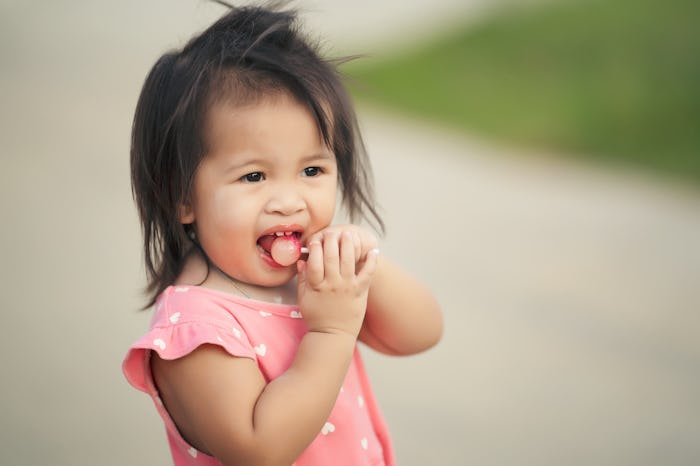Parenting

What Pediatricians Want You To Know About Babies Eating Candy
Concern over choking hazards, sugar intake, allergens, and more all play into the decision.
Watching your baby's face light up with excitement when they taste something delicious for the first time is so much more fun than seeing them spit out mashed lima beans. So, it's not uncommon to wonder when babies can eat candy. Because honestly, as unhealthy as it may be, you know deep down that's the good stuff, and it can really be fun to share a sweet treat with your little one.
"Parents need to assess their child’s readiness for candy," Dr. Sarah Schaffer DeRoo, a pediatrician with Children's National Hospital tells Romper, noting that the answers to the following questions will help parents make this call. "Does the child have teeth? Does the child show interest? If a child is not developmentally ready, it is best to avoid the candy."
Especially around the holiday season when older siblings will consume fistfuls of the sugary goodness, questioning whether or not it's safe for your baby to have a lick of their big brother's sucker is a common thought. While some parents traditionally wait until their baby's first birthday to let them experience their first taste of sugar when they dive into a smash cake, candy is a completely different ordeal.
When it comes to the safety of babies eating candy, it's not just about sugar content. Concerns over choking hazards, the type of candy consumed, developmental readiness, and more, should all factor into a parent's decision on when their baby can try candy.
Choking Hazards
"We typically do not recommend small, round, hard foods to children younger than 3 because of the risk of choking," Dr. Alsan Bellard of Children's National Hospital tells Romper. With this information in mind, any candy that is hard, round, or small (think Skittles, M&M's, Smarties) would be absolutely out of the question for babies.
So, when is the appropriate age to try candies without the looming concern of choking hazards? "By 3 to 4 years of age, children are better able to protect their airways and can safely consume the small, round, hard foods that previously posed a choking hazard," Bellard explains.
However, American Academy of Pediatrics spokesperson Dr. David L. Hill advises that parents may want to wait even longer for particularly chewy or hard candies that pose choking risks. "Age 4 is the earliest anyone would recommend chewy candies," Hill tells Romper. "Even then, hard, round candies might wait even longer, to age 5 or more."
Even if you decide to wait a while before introducing candy, Bellard suggests taking extra precautions to decrease choking risks when consuming all foods during baby and toddlerhood. "To further decrease the risk of choking, toddlers should be seated upright during eating; they should not eat while lying down, walking, or running," he says. "Children should not eat while riding in a car, because parents may not be able to intervene if the child chokes."
Developmental Readiness
Just like many childhood milestones, your child's individual development will play heavily into whether or not they are ready to eat candy.
"Once children have enough teeth and are good at handling a variety of textures, then they can safely eat soft candy," Dr. Scott Krugman, vice chair of pediatrics at the Herman & Walter Samuelson Children’s Hospital at Sinai Hospital of Baltimore, tells Romper. "Most children will be around 2 years, but each child develops at his or her own pace." Additionally, Krugman advises parents to avoid "hard candies, taffy, or whole peanuts" until age 5.
In addition to dental development, your child's ability to wield utensils without flinging mashed potatoes all over your kitchen is something to take into consideration. "Typically, a child who is ready to eat candy has mastered self-feeding, where they are feeding themselves comfortably with spoon," Bellard says.
Allergy Concerns
By the time your little one is developmentally ready to consume candy, they'll likely have already been exposed to potential allergens that they might react to when trying candy for the first time. This means while allergens are something to be mindful of, they are not as looming of a concern as choking.
"As children become toddlers, they can have candy as a treat, but it needs to be soft and not contain whole nuts or be hard, primarily because those are choking hazards," Krugman tells Romper. "The risk of allergy in general is low, but if your child has a history of allergies or if there is a strong family history of food allergy, ask your child’s doctor for advice on what candy might be safe."
Sugar Content
"Candy is a major source of 'added sugars' in a child’s diet," Bellard tells Romper. "Added sugars should be avoided in children less than 2 and they should be limited to less than 25 grams in children older than 2."
Although the sentiment of consuming candy in moderation is key here, it's important to note that the risks of too much sugar too early on in a child's life does carry with it some health risks. "Excessive sugar intake in kids is associated with increased risk for cardiovascular disease and dental caries," Bellard says.
If your little one has a definite sweet tooth, but isn't ready for candy, or you want to avoid adding extra sugar to their diet, they can still savor some sweetness through the foods they do consume. "While infants and toddlers enjoy sweet flavors, their teeth and dietary habits benefit when those flavors come from fresh fruits and sweet vegetables like yams," Hill tells Romper.
Experts:
Alsan Bellard, MD, Children's National Hospital
Sarah Schaffer DeRoo, MD, pediatrician at Children's National Hospital
David L. Hill, MD, American Academy of Pediatrics spokesperson and author of Co-Parenting Through Separation and Divorce
Dr. Scott Krugman, M.D., MS, FAAP, vice chair of pediatrics, Herman & Walter Samuelson Children’s Hospital at Sinai Hospital of Baltimore